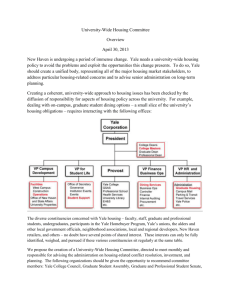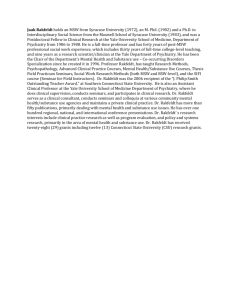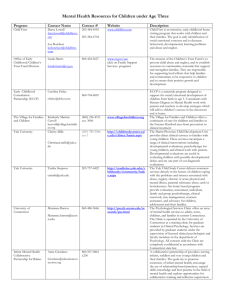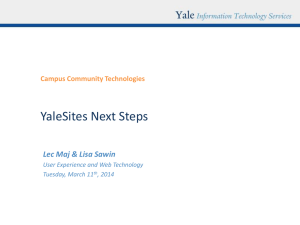mta original - Yale University
advertisement
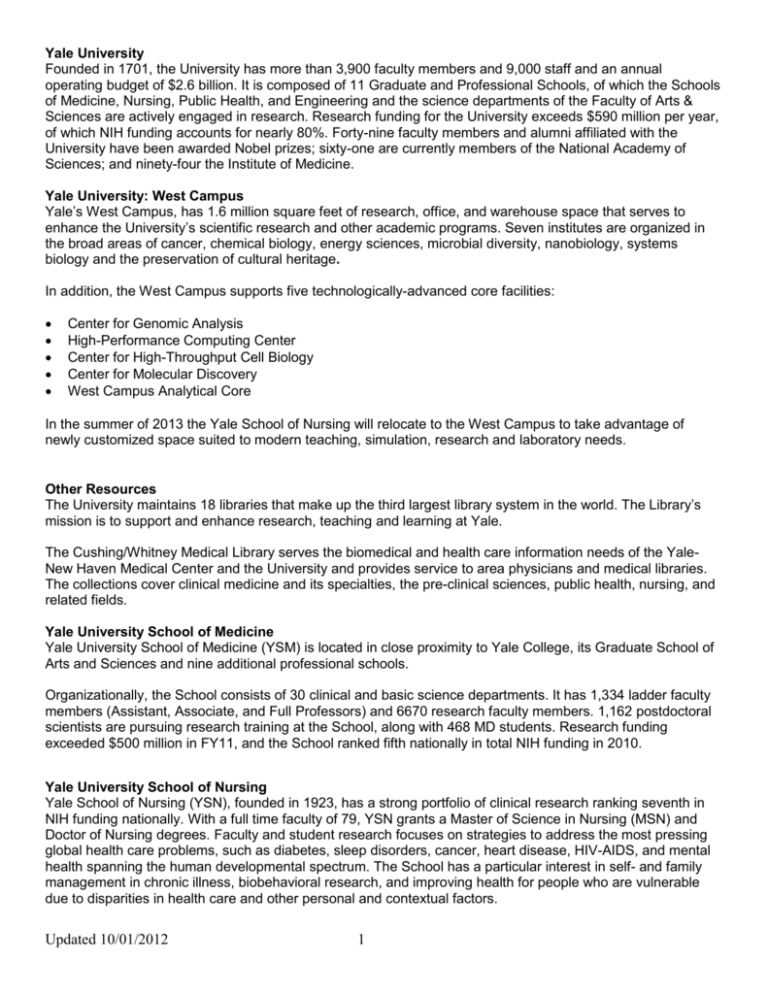
Yale University Founded in 1701, the University has more than 3,900 faculty members and 9,000 staff and an annual operating budget of $2.6 billion. It is composed of 11 Graduate and Professional Schools, of which the Schools of Medicine, Nursing, Public Health, and Engineering and the science departments of the Faculty of Arts & Sciences are actively engaged in research. Research funding for the University exceeds $590 million per year, of which NIH funding accounts for nearly 80%. Forty-nine faculty members and alumni affiliated with the University have been awarded Nobel prizes; sixty-one are currently members of the National Academy of Sciences; and ninety-four the Institute of Medicine. Yale University: West Campus Yale’s West Campus, has 1.6 million square feet of research, office, and warehouse space that serves to enhance the University’s scientific research and other academic programs. Seven institutes are organized in the broad areas of cancer, chemical biology, energy sciences, microbial diversity, nanobiology, systems biology and the preservation of cultural heritage. In addition, the West Campus supports five technologically-advanced core facilities: Center for Genomic Analysis High-Performance Computing Center Center for High-Throughput Cell Biology Center for Molecular Discovery West Campus Analytical Core In the summer of 2013 the Yale School of Nursing will relocate to the West Campus to take advantage of newly customized space suited to modern teaching, simulation, research and laboratory needs. Other Resources The University maintains 18 libraries that make up the third largest library system in the world. The Library’s mission is to support and enhance research, teaching and learning at Yale. The Cushing/Whitney Medical Library serves the biomedical and health care information needs of the YaleNew Haven Medical Center and the University and provides service to area physicians and medical libraries. The collections cover clinical medicine and its specialties, the pre-clinical sciences, public health, nursing, and related fields. Yale University School of Medicine Yale University School of Medicine (YSM) is located in close proximity to Yale College, its Graduate School of Arts and Sciences and nine additional professional schools. Organizationally, the School consists of 30 clinical and basic science departments. It has 1,334 ladder faculty members (Assistant, Associate, and Full Professors) and 6670 research faculty members. 1,162 postdoctoral scientists are pursuing research training at the School, along with 468 MD students. Research funding exceeded $500 million in FY11, and the School ranked fifth nationally in total NIH funding in 2010. Yale University School of Nursing Yale School of Nursing (YSN), founded in 1923, has a strong portfolio of clinical research ranking seventh in NIH funding nationally. With a full time faculty of 79, YSN grants a Master of Science in Nursing (MSN) and Doctor of Nursing degrees. Faculty and student research focuses on strategies to address the most pressing global health care problems, such as diabetes, sleep disorders, cancer, heart disease, HIV-AIDS, and mental health spanning the human developmental spectrum. The School has a particular interest in self- and family management in chronic illness, biobehavioral research, and improving health for people who are vulnerable due to disparities in health care and other personal and contextual factors. Updated 10/01/2012 1 Yale School of Public Health (YSPH) At Yale, the School of Public Health is located on the Medical School campus and serves as a Department of Epidemiology & Public Health in the School of Medicine. Its faculty members are divided into five divisions: Biostatistics, Chronic Disease Epidemiology, Epidemiology of Microbial Diseases, Environmental Health Sciences, and Health Policy & Management. In addition, there are cross-cutting programs in Global Health and Social & Behavioral Sciences. Areas of special strength include the epidemiology of cancer, AIDS, infectious diseases, environmental pollution, chronic diseases and health policy. In 2010, total grant funding at YSPH exceeded $41 million. Affiliated Hospitals Yale-New Haven Hospital (YNHH) is a 1519-bed university teaching hospital, located immediately adjacent to the Medical School. It is the School’s primary teaching hospital and provides comprehensive, multidisciplinary, family-focused and research-supported patient care. The VA Connecticut Healthcare System (VACT), which is closely affiliated with Yale School of Medicine, encompasses an inpatient facility and ambulatory care center in West Haven CT, a second ambulatory care center in Newington CT, and six community-based outpatient facilities in Danbury, New London, Stamford, Waterbury, Windham, and Winsted CT. It offers a full array of clinical services to veterans and is also an active site for multi-center clinical trials and biomedical research. The Psychiatry Service at VACT is one of the principal sites of the Yale Department of Psychiatry. Research Centers and Interdisciplinary Programs The Yale Cancer Center has been an NCI-designated comprehensive cancer center (NIH 3P30 CA16359) for over 30 years. It is one of 41 such Centers in the nation and the only one in Southern New England. Research endeavors at Yale Cancer Center are focused through seven research programs that include faculty members and researchers from a variety of disciplines: Developmental Therapeutics, Cancer Genetics & Genomics, Cancer Immunology, Molecular Virology, Prevention & Control, Radiobiology & Radiotherapy, and Signal Transduction. Cancer treatment for patients is available at Smilow Cancer Hospital at Yale-New Haven through multidisciplinary teams who work together to foster research, innovative cancer treatment, and quality care for its patients. Another prominent research center at the School of Medicine is the Yale Center for Clinical Investigation, which serves as the home for Yale’s Clinical & Translational Science Award (CTSA), originally funded in 2006 and renewed in 2011. YCCI seeks to foster the translation of disease-related discoveries from the laboratory into the clinic and then into the community. This is accomplished by training clinical and translational investigators, stimulating the formation of interdisciplinary teams, participating with the School of Medicine in operating state-of-the-art core facilities, and providing centralized resources for bioinformatics, biostatistics, protocol development, patient recruitment, regulatory support, and data analysis. In addition, the Center has created a new program that brings together the Nursing School, the School of Public Health, and the Robert Wood Johnson Program to support clinical scholars engaged in community-based outcomes research. As a result of these efforts, almost $200 million per year of Yale’s NIH grant support is now directly connected to YCCI. To support the research being carried out by its faculty members and students, the School of Medicine operates a comprehensive set of core facilities, including cores for animal-based research (animal husbandry, animal genomics, animal pathology), cell and molecular imaging (high-resolution optical microscopy, confocal microscopy, electron and cryoelectron microscopy, and X-ray crystallography), MR and PET imaging, genomics, proteomics, and flow cytometry. Updated 10/01/2012 2 Source Documents Yale University University Fact Sheet Financial Report List of Nobel Laureates by University National Academy of Sciences Institute of Medicine Yale University: West Campus Yale West Campus Other Resources Yale University Library Library Information Technology Yale School of Medicine Facts and Figures 2012 University Fact Sheet Financial Report Yale School of Nursing School of Nursing University Fact Sheet Yale School of Public Health School of Public Health Affiliated Hospitals Yale New Haven Hospital VA CT Healthcare System Research Centers and Other Disciplinary Programs Cancer Center Center for Clinical Investigation University Research Centers, Services and Resources Updated 10/01/2012 3

